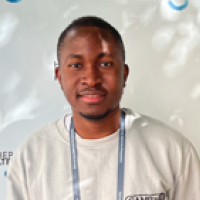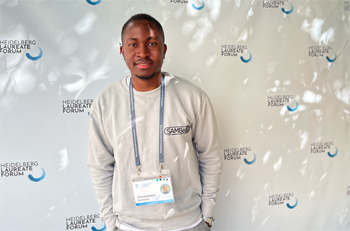
Mathematical snapshots: Tosin Babasola
Tosin Babasola is a PhD student in mathematics at the University of Bath and the EPSRC Centre for Doctoral Training in Statistical Applied Mathematics (SAMBa). Here he tells us about his work on understanding the impact of climate on cocoa crops, why he chose to work in the area, and why the continuous production of cocoa is in everyone's interest.

Tosin Babasola
My area of research falls within the intersection of mathematical modelling, climate science and agriculture. This research involves investigating the impact of climate change on cocoa farming by formulating a mathematical model incorporated with climate data. Cocoa farming is being severely impacted by climate change, and this is what I'm looking at. The goal is to further understand crop behaviour at different stages as we experience a long-term shift in temperatures and weather patterns.
The model I am using is based on the delay differential equation which has the ability to account for the system's past behaviour and generally helps to adequately describe systems which do not involve instantaneous change. In many physical phenomena there are time lags between stimulus and response which is also applicable to crops. The crops do not visibly react to the influence of climatic factors immediately after they are exposed. It often takes some time interval before the effect of such exposure is felt and this is accounted for using the delay differential equation.
The application of this type of equation is not limited to climate or crop behaviour simulation. It can also be used in modelling traffic flow, population growth, disease modelling and much more. In fact, it can be generally used as an improvement to previous approaches to modelling which are based on ordinary differential equations.
To find out more about Tosin's work on a more technical level, watch his talk at the Black Heroes of Mathematics conference 2022.
What interests me in this area is my utmost desire to conduct research that is both relevant to my African background and equally important to the life of people in the UK. Before joining the University of Bath, UK, where I am completing my PhD programme, I had the opportunity to study in Nigeria, South Africa and Kenya at the University of Ilorin, the African Institute for Mathematical Sciences (AIMS) and the Pan African University (PAUSTI) respectively. During this period, I had the opportunity to meet several African students and discuss the situation in their home countries. Through this, I was able to establish that agriculture is mostly practised across many African countries either as a means for farmers to sustain themselves or as a source of export.
So when I started my PhD research with the goal of embarking on impactful research, I decided to look into the cocoa crop which is of high economic importance and widely grown across West Africa. In particular, Africa has the largest share of world cocoa production while the UK is one of the top chocolate consumers. Without cocoa there can be no chocolate, so it's in everyone's interest for the production of cocoa to be continuous. Hence we need to adapt to climate change to ensure an abundant onward supply, but a solution can't be found without the help of applied mathematics and this is what motivates me towards this area.
There are quite a lot of things I enjoy about being part of SAMBa and working within my research group. However, I will just name a few of them. Firstly, working within my supervisor Chris Budd and his research group encourages a balance between work and social life. In fact, we sometimes look for a simple reason to celebrate together. Also, the team is comprised of amazing members who are always ready to brainstorm and support each other whenever the need arises. Another thing I enjoy as part of SAMBa and working with my supervisor is the opportunity to be involved in other interesting industrial-based projects either through the Virtual Forum for Knowledge Exchange in the Mathematical Sciences (V-KEMS) or the SAMBa integrative think tank (ITT). This gives firsthand experience on how to use mathematical skills in industry.
I enjoy flexibility in my tasks and that's why I try to be flexible with my working hours. Although over time I realised that I am more energetic and productive in the morning. So I mostly do the technical part of my research in the morning while the more routine tasks are often scheduled for the afternoon. On a typical day I arrived at my designated office space before 9 am and leave when I have met my realistic daily target. I do not often set a time for when I leave. So most times I can leave the office early or late depending on whether I have reasonably accomplished the task set for the day. On most days, the tasks I engage in include reading scientific journals, data cleaning and exploration, coding, model analysis and validation.
My favourite mathematical moment happened when I was sleeping. An idea suddenly came to my head on the concept I will need to apply to prove a theorem I have been struggling with for a long time. Funnily, I had stopped thinking about the problem for quite some time because it seemed I had exhausted all the ideas I could implement. But on that fateful day, in the middle of the night, the idea came. I immediately got out of bed to grab a pen and a piece of paper. I was so happy when the concept worked. That night was definitely one of my favourite mathematical moments.
About this article
Tosin Babasola (middle) with the Plus Editors Rachel Thomas (left) and Marianne Freiberger (right) at the Heidelberg Laureate Forum 2022.
We first met Tosin at the virtual Heidelberg Laureate Forum 2020. You can watch a video interview with him we conducted at the time. We were inspired to interview him again after watching him talk at the Black Heroes of Mathematics conference 2022.
This article was produced as part of our collaboration with the Isaac Newton Institute for Mathematical Sciences (INI) – you can find all the content from our collaboration here. The INI is an international research centre and our neighbour here on the University of Cambridge's maths campus. It attracts leading mathematical scientists from all over the world, and is open to all. Visit www.newton.ac.uk to find out more.
